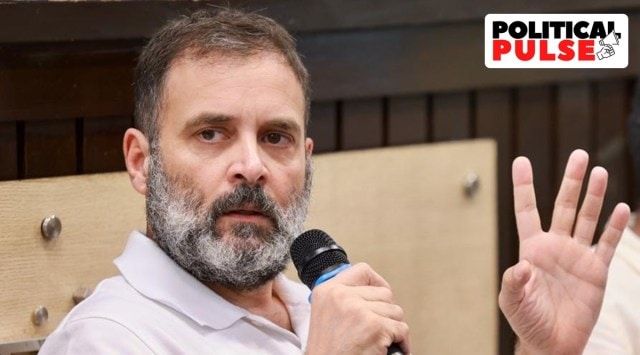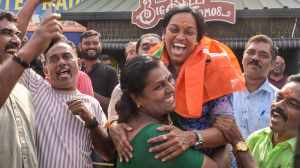Stay on Rahul Gandhi conviction: A look at the NCP MP who went to SC for reinstatement in LS
Lakshadweep NCP MP Mohammed Faizal was disqualified within two days of sentencing in January; he was not reinstated as MP till March end, with the LS Secretariat finally doing so hours before his hearing in Court
 The Supreme Court on Friday stayed the conviction of Congress leader Rahul Gandhi in a 2019 defamation case. (Facebook: Rahul Gandhi)
The Supreme Court on Friday stayed the conviction of Congress leader Rahul Gandhi in a 2019 defamation case. (Facebook: Rahul Gandhi) The Supreme Court on Friday stayed the conviction of Congress leader Rahul Gandhi in a 2019 defamation case over his remarks against the Modi surname.
A three-judge bench of Justices B R Gavai, P S Narasimha and Sanjay Kumar said: “No reason has been given by the trial judge for imposing the maximum sentence, the order of conviction needs to be stayed pending final adjudication.”
This statement assumes importance as Rahul’s disqualification came about due to the length of the sentence awarded to him.
Section 8(3) of the Representation of the People Act, 1951, states that “a person convicted of any offence and sentenced to imprisonment for not less than two years shall be disqualified from the date of such conviction and shall continue to be disqualified for a further period of six years since his release”.
The sentencing of Rahul to two years meant he was disqualified as an MP and faced the prospect of not being able to contest the 2024 Lok Sabha polls.
The Supreme Court was hearing a plea filed by Rahul against a Gujarat High Court verdict, which had earlier dismissed his plea seeking a stay on his conviction by the Surat court.
The grant of stay by the SC essentially means that Rahul’s conviction will be kept in abeyance — as though it did not exist. A Surat Sessions court is currently hearing an appeal against the trial court judgment convicting him. As per the Supreme Court order, Rahul’s conviction is stayed until that appeal process is concluded.
Rahul’s case has parallels to a recent case of Lakshadweep NCP MP Mohammed Faizal.
Faizal, along with a group of people, was accused of trying to kill Mohammed Salih, the son-in-law of late Congress leader and former Union Minister P M Sayeed, during the 2009 Lok Sabha polls. Sayeed’s son Muhammed Hamdulla Sayeed won that election.
Faizal argued that a “false case” had been registered against him. While the trial was ongoing, he was elected to the Lok Sabha in 2019.
On January 11 this year, a Sessions Court sentenced Faizal and four others — out of a total 35 accused — to 10 years in jail and imposed a fine of Rs 1 lakh each on them in the attempt-to-murder case.
On January 13, the Lok Sabha Secretariat notified Faizal’s disqualification as an MP under Section 8(3) of The Representation of the People Act, 1951 – the same provision under which Rahul was disqualified following his conviction.
On January 18, with Faizal’s appeal against the Sessions Court order still pending before the Kerala High Court, the Election Commission announced a by-election to fill the Lakshadweep seat.
On January 25, two days before the scheduled bypoll, the Kerala High Court suspended Faizal’s conviction and his 10-year sentence. The EC subsequently announced that it had decided to “withhold” the byelection in Lakshadweep.
Following this, as he was not reinstated as an MP, Faizal went to the Supreme Court against the Lok Sabha Secretariat’s “unlawful action”.
Hours ahead of the hearing in the Supreme Court on March 29, the Lok Sabha Secretariat in an order said: “In view of order dated 25.01.2023 of the High Court of Kerala, the disqualification of Shri Mohammed Faizal P P notified vide Gazette notification no. 21/4/(1)/2023/TO(B) dated the 13th January, 2023 in terms of the provisions of Article 102(1)(e) of the Constitution of India read with Section 9 of the Representation of the People Act, 1951, has ceased to operate subject to further judicial pronouncements.”
- 01
- 02
- 03
- 04
- 05































